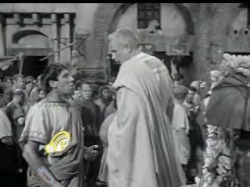Julius Caesar: The victorious leader of Rome, it is the fear that he may become King and revoke the privileges of men like Cassius that leads to his death at the hands of Cassius, Brutus and the rest of other conspirators.
Theres is a belief that Julius Caesar will take over the power and turn the Roman republic into an Empire that is ruled by himself. This gets a lot of people concerned, within them, his friends (such as Brutus) and many senators and aristocrats. This leads them to conspire against him and to his murder
He is introduced in the play as an arrogant person who doesn't fear anything. He appears to us as a man almost guided not so much by his own will but what he believes is best for its own people. Nevertheless, his own attitude would lead him to his grave.
His wife and the soothsayer try to warn him not to go to the senate in the "ides of March", however he cares the less and arrogantly goes. This very same day he is assasinated.
He later comes back in the play as a ghost and huants Brutus (Act V).
Octavius Caesar: He is Julius Caesar's adopted son. History says that Octavius ultimately became ruler of the Roman Empire following his defeat of Mark Antony in Egypt, as Shakespeare's "Antony and Cleopatra" tragedy states. In this play, Octavius with Mark Antony and Lepidus (the second leadre), destroy the forces of Brutus and Cassius and kill the two conspirators. (Act V).
Marcus Antonius (Mark Antony): One of the leaders thar rule Rome. After Julius Caesar's assassination he becomes really famous because of his speech. During his discourse, Mark Antonius turns the Romans against Brutus shortly after Caesar's death. Famous for these lines that will remain in time: "Friends, Romans, countrymen, lend me your ears;" (Act III, Scene II, Line 79),
Mark Antonius with his fellow leaders, Octavius and Lepidus later defeat Brutus and Cassius on the Plains of Philippi in Act V.
Cassius: One of the original conspirators against Julius Caesar. As the other conspirators he fears that if Caesar gets to the power he will lose all of his privileges.
He differs from the other conspirators as he is the one who leads his assassination. He is the one that gathers all the people and turn them against Caesar. He is also the person that manipulates Brutus and make him think that Julius Caesar will be a bad ruler for Rome.
The great thinker of the conspiracy, his advice is continually overruled by Brutus with tragic results for the conspirators.
First, his advice to kill Mark Antony as well as Caesar is ignored leading to Mark Antony becoming their greatest enemy.
Like Brutus, he dies by suicide in Act V, when fearing Brutus dead, he commits suicide.
Flavius and Marullus: Two Tribunes introduced to us at the beginning of the play. It is for the converzation they have that we know the deep mistrust and fear there is in Rome about Caesar's popularity towards getting to the power. This Flavius from the tribune is not the same Flavius that appear in Act IV as a soldier.
Calphurnia: The wife of Caesar, she begs her husband not to go to the Senate on "the ides of March" but he does not listen to her. She cries out "'Help, ho! They murder Caesar!'" three times in her sleep, the day before Caesar's death. It is because of these dreams and several other ocurrences that she knows that her husband is going to get killed. Unfortunately, little after Calphurnia convinces Caesar to stay home and avoid death, Decius Brutus, arrives at Caesar's home convincing him that these images mean that Rome will be revived by Caesar's presence at the Senate the following day. Caesar then ignores his wife's advices and goes after his fatal fate.
Casca: One of the conspirators against Caesar. He starts the actual assassination of Julius Caesar by stabbing him from behind.
Terminus: One of the conspirators, however he does not stab Julius Caesar. He is the man responsible for saving Mark Antony's life following Julius Caesar's assassination. He leads Mark Antony away from the Senate house right after the murder and backs up Brutus' suggestion that his life should be taken away.
Publius: A Senator who travels with Caesar to the Senate House the day Julius Caesar is killed. He witnesses his assassination. Deeply "confounded" or confused the murder of Julius Caesar (Act III, Scene I, Line 86), he is used by Brutus to tell the citizens of Rome that Caesar aside, no one else will be hurt (Act III, Scene I, Lines 89-91).
Marcus Brutus: He is probably the most complex character in this play. Brutus is one of the men who assassinate Caesar in the Senate. Though Brutus is one of the conspirators, he does not kill Caesar for greed, selfishness, or envy, nor to keep his social position like so many of the other conspirators. This Brutus makes very clear in his speech in Act III, Scene II (Lines 12-76), when he explains his actions as being for the good of Rome.






